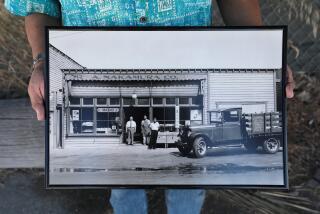New Moorings : Mariners Center Gives Sailors a Place to Call Home
- Share via
PORT HUENEME — Five men stand on the ramp outside a white trailer, tapping ashes from their cigarettes and sharing stories of home and voyage in the cool night air at the Port of Hueneme.
They are at the only designated place on port property where seamen can relax rather than work: the new International Mariners Center, which will be dedicated formally on Sunday.
The center is an important resource for international mariners who spend most of their lives confined to their ships, far from home and family. When they arrive in a port, many still cannot get out and roam because they lack visas.
Even those who have proper documentation face problems finding rides to nearby shopping areas, where they can buy necessities and luxuries unavailable at sea. They often carry bags of coins to pay phones to make expensive calls to their families.
The mariners center is a nondenominational undertaking by three religious groups devoted to seamen--the Seamen’s Church Institute, the Apostleship of the Sea and the Lutheran Maritime Ministry.
One recent evening, a group of seamen from the Philippines enjoyed a few hours of respite off the Crown Frost, a Cool Carriers ship that was docked in the port through Friday loading citrus for a run to Japan. As they chatted, they switched between English and their native Tagalog.
Dante Psongco, the ship’s chief cook, had just finished producing a meal for almost 20 crew members.
He said he wanted to shop for presents for his three children, but problems with his visa prevented him from doing more than just wandering around the port.
Jim Havick runs the mariners center--which is housed in one-quarter of the 40-foot-long white trailer the volunteers share with the U.S. Department of Agriculture--and built many of its furnishings. The trailer sits in the shadow of Del Monte’s new refrigerated facility just inside the port’s main gate.
Havick is a retired food service supervisor for Motorola in Arizona who started volunteering to help the seamen at the port more than a year ago.
“I’ve always been interested in ships,” said the Port Hueneme resident. “I can’t swim a lick but I like to be by the water. I like to smell the water.
“And the more I’ve been around the ships, the more I like the seamen and their way of life. They’re very courteous and appreciative when you do something for them,” he said.
When Havick began volunteering through his church group, he would visit the ships with supplies and reading materials for seamen. He would offer to help them with a range of things, from getting a new toothbrush to listening to family problems.
He and other volunteers still visit the ships. They minister to those who cannot or are unwilling to go ashore and let the seamen know about the mariners center, which holds a variety of diversions.
In one corner of the center sits an organ donated by the port’s executive director, Bill Buenger. Hot and cold water are available for making coffee, tea or hot chocolate.
The center offers a library of old copies of National Geographic, Reader’s Digest and other donated reading materials. And three homemade phone booths, decorated with colorful Christmas lights, dominate one wall.
The Seamen’s Church Institute has its own calling cards and a switchboard in Los Angeles for seamen who want to make long-distance calls.
On this evening, Pierre Padu sits in one of the booths, making a call to his four children in the Philippines. Using the institute’s card, Padu’s call costs only 84 cents a minute, less than half what he would pay to make the same call from his ship.
Although it is early evening in Port Hueneme, it is 11 a.m. at Padu’s wife’s home. The couple are separated, but Padu is able to talk to his children, ages 12, 10, 6 and 1, because it is a school holiday.
Vic Villote, a former seaman who lives in Port Hueneme, volunteers at the center to help his old comrades.
“It’s very difficult if you are a sailor,” he said. “If you want to go someplace, you need a guide.”
Villote can describe in detail the difficulties he had in various ports when he wanted to call his wife or hail a taxi. Now, he uses his experiences to give support to others. “They’re my family in this place,” he said.
Villote, Havick and other volunteers bring their cars so they can take seamen who have visas to their favorite stores--Kmart, Wal-Mart, Circuit City and Radio Shack. They also take mariners to the bank so they can wire money home to their families.
Havick said he would like to see the center grow, with room for a television as well as pool and Ping-Pong tables. Compared to mariners centers like the one in Sydney, Australia, which boasts a disco and a bar, Port Hueneme’s is modest, he said.
But the center serves its purpose.
“Our basic premise is to spread the gospel and see what we can do for the seamen,” Havick said.
More to Read
Sign up for Essential California
The most important California stories and recommendations in your inbox every morning.
You may occasionally receive promotional content from the Los Angeles Times.













